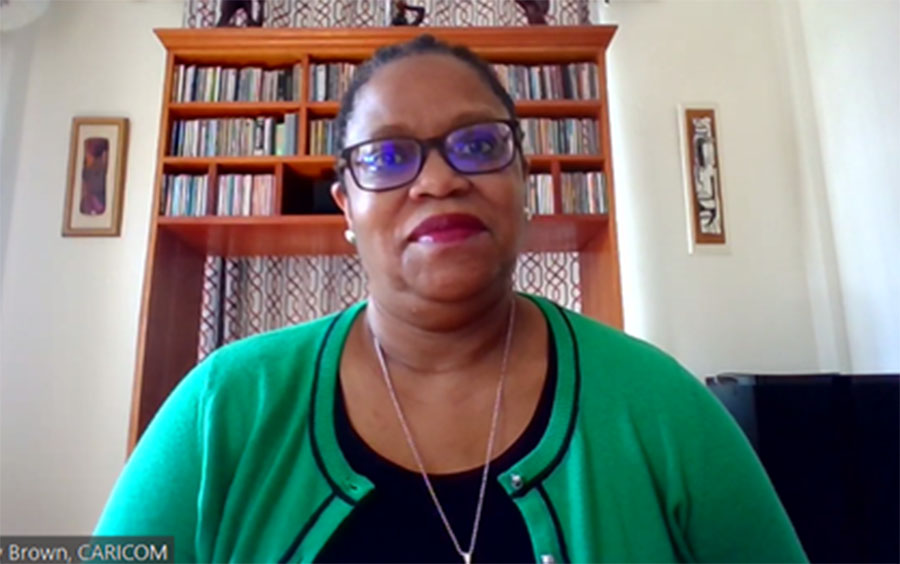CARICOM’s Regional Cultural Committee (RCC) convened its Thirtieth Meeting virtually from 12-13 December 2023 which focused on ‘Building a resilient culture sector in the Region’. Participants included permanent secretaries and directors of culture from 13 Member States and Associate Members, representatives of the Caribbean Development Bank (CDB), The University of the West Indies at Mona, representatives of the United Nations Educational, Scientific and Cultural Organization (UNESCO) and staff of the CARICOM Secretariat.
A press statement from CARICOM said that Dr. Hilary Brown, Programme Manager, CARICOM’s Culture and Community Development, used her opening remarks to illustrate the correlation between building a resilient culture sector, a consequence of the Covid-19 pandemic, and ensuring sustainable development within the Region. “We all agree that there is much that needs to be done to build a resilient culture sector so that culture can fulfil its role as a driver and enabler of the sustainable development of the Region.” Dr. Brown noted that, “The Culture sector has been overlooked and undervalued for too long. The fallout from the pandemic has clearly demonstrated the urgency of strengthening the enabling environment and making the necessary investments so the creative sector can grow.”
Strategies to enhance the culture sector were articulated in a Draft Regional Development Strategy for the Creative Industries in CARICOM, which was developed in 2012 and revised in 2019, and the Cultural and Entertainment Services Strategy for CARIFORUM, completed in 2017. CARICOM said the RCC discussed both frameworks with the aim of advancing them into implementation so that the Region can develop a vibrant, thriving creative economy and globally competitive creative industries.
CARIFESTA
CARIFESTA is a high priority of the RCC and discussions followed on how best to organise the regional mega festival in the context of a limited fiscal space. Since CARIFESTA’s Strategic Plan was approved in 2004, elements of the Plan was implemented on a phased basis and Dr. Brown suggested that it was time to advance a blended approach to the Festival with a larger number of virtual components, “Collectively, we have made many improvements to how we organise and manage CARIFESTA over the past fifteen years, and most recently, realised a major achievement with the design and launch of the permanent CARIFESTA logo in 2019 – which is important for leveraging the intellectual property value of the Festival.”
Dr. Brown emphasised that much more needs to be done to make the CARIFESTA festival function effectively as a catalyst for developing the Region’s cultural and creative industries and promoting the Caribbean’s cultural heritage and identity. “We look forward to the continued guidance of the RCC and the Interim Festival Directorate to make this a reality,” she said.
Creative Caribbean: An Ecosystem of ‘Play’ for Growth and Development Project
The CARICOM statement said that updates were provided on the successes and implementation challenges for projects under the “Creative Caribbean: An Ecosystem of ‘Play’ for Growth and Development” Project. The CARICOM Secretariat, The University of the West Indies and UNESCO designed the project to provide much-needed support to creatives in the Region through targeted grant support to artistes, professional arts associations and cultural entrepreneurs.
The project, the statement said, provided vital resources to develop the enabling environment for the creative sector, including the development of national registries of artistes. It also supported the preparation of a draft model legislation for the Creative Industry Development Bill for Member States to protect and incentivise the sector, developing a model satellite account for data collection and management, and the development of a regional creative content hub to facilitate innovation and creativity.
CARICOM noted that the Caribbean Development Bank’s Creative and Cultural Industries Innovation Fund (CIIF) continues to provide valuable grant support for creative entrepreneurship in the Region, for data collection, innovation and job creation, and according to Dr. Brown, the CDB has decided to recapitalise and continue the operations of the CIIF beyond the initial investment of US$2.6 million that established the fund in 2017 and facilitated the first cycle of funding.
Reparations for Native Genocide and Slavery
Dr. Brown updated the RCC Committee on the matter of reparations for Native Genocide and Slavery, which are placed high on the agenda of Heads of Government and the Region and reminded the Committee that the Region is pursuing reparations from Europe for over 400 years of slavery and colonialism, which CARICOM said, resulted in the systemic underdevelopment of the Region and persistent poverty in many communities.
Dr. Brown highlighted the steps being undertaken by CARICOM Heads of Government to form a coalition with the African Union to forward what is arguably one of the most important human rights movements of the twenty-first century. She commended the CARICOM Reparations Commission (CRC), which is observing its Tenth Anniversary this year, for providing global thought leadership and strident advocacy on reparations, inspiring a growing, global movement for reparatory justice.
She explained that the Community intends to step up its campaign for reparations in the United Nations and the Commonwealth and in the International Court of Justice. “Ministries with responsibility for Culture continue to have an important role to play in facilitating public education and dialogue on reparatory justice, through the platform of your existing national events, and within the context of the International Decade for People of African Descent (2015-2024),” stated Dr. Brown.
The overarching goal of the meeting was to establish a coordinated response to revitalise the Caribbean’s creative sector and economy as the Region emerges from the devastation of the COVID-19 pandemic on the creative sector and to propose the necessary policies and programmes to ensure a resilient and sustainable future and included a discussion on the work undertaken by UNESCO in collaboration with the Caribbean Disaster Emergency Management Agency (CDEMA) to develop the Caribbean Plan of Action for Disaster Resilience and Recovery of the Culture Sector.





